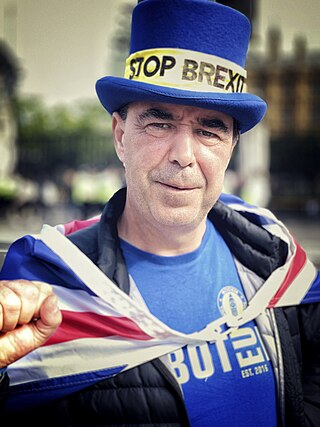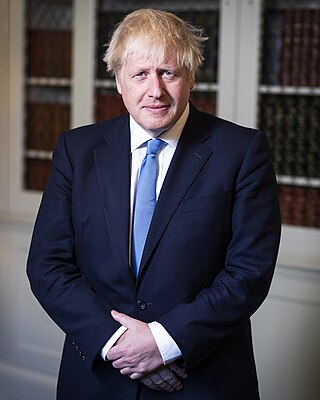
Alexander Boris de Pfeffel Johnson is a British politician and writer who served as Prime Minister of the United Kingdom and Leader of the Conservative Party from 2019 to 2022. He was previously Foreign Secretary from 2016 to 2018 and Mayor of London from 2008 to 2016. He was Member of Parliament (MP) for Henley from 2001 to 2008 and for Uxbridge and South Ruislip from 2015 to 2023.

Get Britain Out is a United Kingdom-based independent cross-party grassroots Eurosceptic group which campaigned for the United Kingdom to leave the European Union. The campaign is still in operation and is pushing for the UK to break away from continued alignment with the European Union.

Brexit was the withdrawal of the United Kingdom (UK) from the European Union (EU). Following a referendum held in the UK on 23 June 2016, Brexit officially took place at 23:00 GMT on 31 January 2020. The UK, which joined the EU's precursors the European Communities (EC) on 1 January 1973, is the only member state to have withdrawn from the EU. Following Brexit, EU law and the Court of Justice of the European Union no longer have primacy over British laws. The European Union (Withdrawal) Act 2018 retains relevant EU law as domestic law, which the UK can amend or repeal.

The 2019 United Kingdom general election was held on Thursday 12 December 2019, with 47,074,800 registered voters entitled to vote to elect 650 Members of Parliament (MPs) to the House of Commons. The governing Conservative Party, led by the prime minister Boris Johnson, won a landslide victory with a majority of 80 seats, a net gain of 48, on 43.6 per cent of the popular vote, the highest percentage for any party since the 1979 general election, though with a narrower popular vote margin than that achieved by the Labour Party over the Conservatives at the 1997 general election. This was the second national election to be held in 2019 in the United Kingdom, the first being the 2019 European Parliament election.

Theresa May's tenure as Prime Minister of the United Kingdom began on 13 July 2016 when she accepted an invitation of Queen Elizabeth II to form a government, succeeding David Cameron, and ended on 24 July 2019 upon her resignation. May's premiership was dominated by Brexit, terrorist attacks in Westminster, the Manchester Arena and London Bridge, the Grenfell Tower fire, and the Salisbury poisonings. As prime minister, May also served simultaneously as First Lord of the Treasury, and as Minister for the Civil Service. She also served as Leader of the Conservative Party.
A by-election for the House of Commons constituency of Sleaford and North Hykeham in Lincolnshire, England, was held on 8 December 2016. It was triggered by the resignation of the Conservative member of parliament (MP) Stephen Phillips, who left Parliament on 4 November 2016 due to policy differences with the Conservative government led by the prime minister, Theresa May, over Brexit – the British withdrawal from the European Union (EU). The Conservatives nominated Caroline Johnson, a paediatrician, to replace Phillips; she won the by-election with more than 50 per cent of the vote, a sizable majority. The Conservatives' vote share fell slightly compared to the result at the previous general election in 2015.

The second May ministry was formed on 11 June 2017 after Theresa May returned to office following the June 2017 snap general election. The election resulted in a hung parliament with the Conservative Party losing its governing majority in the House of Commons. On 9 June 2017, May announced her intention to form a Conservative minority government, reliant on the confidence and supply of the Democratic Unionist Party; a finalised agreement between the two parties was signed and published on 26 June 2017.

The 2019 Conservative Party leadership election was triggered when Theresa May announced on 24 May 2019 that she would resign as leader of the Conservative Party on 7 June and as Prime Minister of the United Kingdom once a successor had been elected. Nominations opened on 10 June; 10 candidates were nominated. The first ballot of members of Parliament (MPs) took place on 13 June, with exhaustive ballots of MPs also taking place on 18, 19 and 20 June, reducing the candidates to two. The general membership of the party elected the leader by postal ballot; the result was announced on 23 July, with Boris Johnson being elected with almost twice as many votes as his opponent Jeremy Hunt.

People's Vote was a United Kingdom campaign group that unsuccessfully campaigned for a second referendum following the UK's Brexit vote to leave the European Union (EU) in 2016. The group was launched in April 2018 at which four Members of Parliament spoke, along with the actor Patrick Stewart and other public figures.

The Brexit withdrawal agreement, officially titled Agreement on the withdrawal of the United Kingdom of Great Britain and Northern Ireland from the European Union and the European Atomic Energy Community, is a treaty between the European Union (EU), Euratom, and the United Kingdom (UK), signed on 24 January 2020, setting the terms of the withdrawal of the UK from the EU and Euratom. The text of the treaty was published on 17 October 2019, and is a renegotiated version of an agreement published in November 2018. The earlier version of the withdrawal agreement was rejected by the House of Commons on three occasions, leading to the resignation of Theresa May as Prime Minister and the appointment of Boris Johnson as the new prime minister on 24 July 2019.

Steven Bray is a British activist from Port Talbot in South Wales who, in 2018 and 2019, made daily protests against Brexit in College Green, Westminster. He is variously known as Stop Brexit Man, Mr Stop Brexit, or the Stop Brexit guy.
The Irish backstop was a proposed protocol to a draft Brexit withdrawal agreement that never came into force. It was developed by the May government and the European Commission in December 2017 and finalised in November 2018, and aimed to prevent an evident border between the Republic of Ireland and Northern Ireland after Brexit.

A referendum on the Brexit withdrawal agreement, also referred to as a "second referendum", a "rerun", a "people's vote", or a "confirmatory public vote", was proposed by a number of politicians and pressure groups as a way to break the deadlock during the 2017–19 Parliament surrounding the meaningful vote on the Brexit deal.

Brexit negotiations in 2019 started in August, after having originally concluded in November 2018 with the release of the withdrawal agreement. Negotiations took place between the United Kingdom and the European Union during 2017 and 2018 for the withdrawal of the United Kingdom from the European Union following the referendum held on 23 June 2016.
Brexit was the withdrawal of the United Kingdom from the European Union at 23:00 GMT on 31 January 2020. As of 2020, the UK is the only member state to have left the EU. Britain entered the predecessor to the EU, the European Communities (EC), on 1 January 1973. Following this, Eurosceptic groups grew in popularity in the UK, opposing aspects of both the EC and the EU. As Euroscepticism increased during the early 2010s, Prime Minister David Cameron delivered a speech in January 2013 at Bloomberg London, in which he called for reform of the EU and promised an in–out referendum on the UK's membership if the Conservative Party won a majority at the 2015 general election. The Conservatives won 330 seats at the election, giving Cameron a majority of 12, and a bill to hold a referendum was introduced to Parliament that month.

Boris Johnson's tenure as Prime Minister of the United Kingdom began on 24 July 2019 when he accepted an invitation of Queen Elizabeth II to form a government, succeeding Theresa May, and ended on 6 September 2022 upon his resignation. Johnson's premiership was dominated by Brexit, the COVID-19 pandemic, the Russian invasion of Ukraine, and the cost of living crisis. As prime minister, Johnson also served simultaneously as First Lord of the Treasury, Minister for the Civil Service, Minister for the Union, and Leader of the Conservative Party.

Boris Johnson has declared his position on many political issues through his public comments. Johnson's political positions have changed throughout his political career. His policies, views and voting record have been the subject of commentary during Johnson's tenure in various positions, including as Mayor of London from 2008 to 2016 and Prime Minister of the United Kingdom from 2019 to 2022.

The European Union (Withdrawal) Act 2019, informally referred to as the Benn Act, was an act of the Parliament of the United Kingdom that required the Prime Minister of the UK to seek an extension to the Brexit withdrawal date—then scheduled for 31 October 2019—in certain circumstances. The main provisions of the Act were triggered if the House of Commons did not give its consent to either a withdrawal agreement or leaving without a deal by 19 October 2019. The Act proposed a new withdrawal date of 31 January 2020, which the Prime Minister accepted if the proposal was accepted by the European Council.
2010s in United Kingdom history refers to significant political and societal historical events in the United Kingdom in the 2010s, presented as a historical overview in narrative format.














